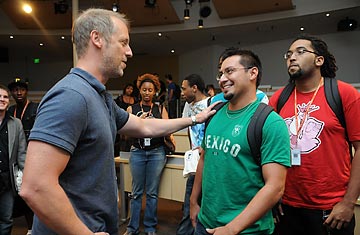
Atlantic Records executive Steve Robertson, left, chats with students during a Grammy U 101 presentation at Full Sail University in Winter Park, Fla., on July 30, 2009.
At this year's Grammys, the five nominees for Album of the Year have something peculiar in common: they were all were mixed or engineered by graduates of Full Sail University. In fact, this year's Grammy-nominated projects were worked on by 74 alums of Full Sail U in total.
Full who?
Full Sail University, a.k.a. the other FSU, is located in Winter Park, Fla., near Orlando. The for-profit college, which was founded in 1979 and originally located in Ohio, offers 33 degree programs in various facets of entertainment media to about 13,000 students, some of whom attend classes online.
With a 191-acre campus that features a back lot, soundstages and 110 studios packed with dazzling equipment, could it be the best-kept secret in higher ed?
The school's director of alumni, Jay Noble, who bears a resemblance to Stephen Colbert, is quick to point to the success of graduates working on Hollywood movies, making magic at Pixar and, of course, taking home those Grammys.
"Full Sail is well respected in the industry," says Phil Tan, a two-time Grammy winner who graduated from Full Sail in 1990. Tan mixed Katy Perry's Teenage Dream, which is up for Album of the Year, and is now working on mixes for Jennifer Hudson, Wiz Khalifa and Hamilton Park.
But even though some alums like Tan are having remarkable success, Full Sail is still subject to the criticism currently directed toward other for-profit schools: that it is expensive, that its credits often don't transfer (for example, Florida State won't accept them) and that the bright future touted by admissions counselors doesn't always materialize.
"I have been pretty successful in the business, but I attribute none of it to Full Sail," says Ryan Goldbacher, a 2005 Full Sail grad and the founder of Rain King Recording in Nashville. Goldbacher went so far as to post a video on YouTube that calls Full Sail a "scam," and his is one of numerous online rants by former students, some named and some anonymous, claiming the school is a big rip-off. (Another common criticism: several videos and blogs mock Full Sail with nicknames like "Full Male" because female students are in short supply.)
If anything, Goldbacher says, the school hurt him at his first internship, at a studio in Nashville. He was hired, he says, based on a personal connection rather than his résumé. "The staff engineer asked me where I went to school," Goldbacher says. "When I told him Full Sail, he said, 'You're really gonna want to keep that on the down-low. Full Sail pumps out amateurs.'"
Full Sail's Noble is unfazed by such criticism and says the online vitriol is just the Internet being the Internet. "I think we do a great job of preparing every individual student for the industry," he says. "Our placement percentages speak for themselves: 71% to 93% of students find jobs in the industry they're trained for."
It's true that a two-year degree in sound engineering can cost up to $72,775, roughly the cost of two years' tuition at Harvard. But the school's default rate is low, averaging around 3% for the past five years — which is better than the national average.
So is Full Sail a hip, state-of-the-art professional academy that mints successful music-world movers and shakers? Or is it yet another for-profit that fills music-obsessed dudes with dreams of glory, then leaves them with vast debt and a low-paying job at Guitar Center?
It depends on whom you ask and, perhaps, where you are. "The farther you get from Orlando, the better Full Sail's reputation — which makes sense," says '09 graduate Adam Tuminaro, the drummer in a Florida band called the Crazy Carls. "Wherever you go to school, if you want a chance at being successful you have to get out of Orlando."
